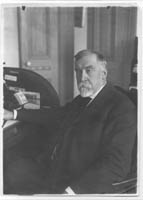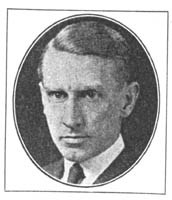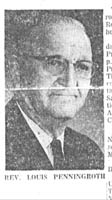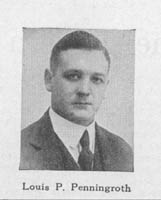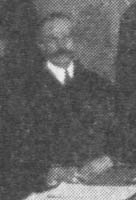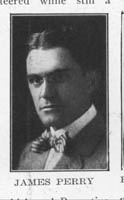Table of Contents
Key Figures
YMCA Secretaries
a | b | c | d | e | f | g | h | j | k | l | m | n-o | p | r | s | t-u | v | w | y-z
Konstantin Konstanovich Pahlen (1861-1923)
A Russian count of Latvian origin, Pahlen was a loyal tsarist official and a patron of the Miyak (Lighthouse), the name of the Russian YMCA. Pahlen spoke German and was a Lutheran. He held a number of government posts including Minister for Peasant Affairs and Vice Governor of the Warsaw region. Pahlen was wounded in an assassination attempt during the Revolution of 1905. In 1905, he became a senator of the First Department of the Senate. In response to revolts and charges of government corruption in Turkestan, Tsar Nicholas II sent Pahlen to lead a senatorial investigation. Pahlen visited most of Turkestan between June 1908 and June 1909 and uncovered a great deal of corruption. He outlined new colonization policies in his twenty volume report, but Prime Minister Peter Stolypin shelved most of Pahlen's recommendations and findings. While in St. Petersburg, Pahlen became involved with the Miyak as the Association attempted to grow from its base in the capital and Moscow. Pahlen supported Archibald Harte's mission to Russia to gain access to prison camps in 1915 to provide War Prisoners' Aid (WPA) services to Central Power prisoners. In May 1916, Paul Des Gouttes, President of the World's Alliance, contacted Pahlen regarding Harte's independent actions in negotiating WPA policies in Germany, Austria-Hungary, and Russia. This marked the beginning of tensions between Harte and the World's Committee. In 1917, Pahlen fled to Finland after the revolution and eventually settled in Wernigerode, Germany. He became involved in missionary work in Russia by 1920, working with the Licht im Osten (Light in the East).
William Peet
An American missionary in the Ottoman Empire, Dr. Peet represented the American Board of Commissioners for Foreign Missions in Constantinople and served as the Treasurer for the Bible Society and Missionary Board. Peet was a member of the Board of Managers of the Constantinople YMCA before World War I. He supported E.O. Jacob's work in Turkish military hospitals after the Ottomans entered the war in November 1914 as an invaluable service. Peet was included in the new YMCA Board of Directors when that Association was reorganized in December 1915 in response to the Turkish government's increasing pressure on the organization. The new board decided to close down the Association and lease the building to the Dutch government. The facility became a warehouse to provide relief parcels to Allied POW's in Turkey. Peet also supported Dirk Johannes Van Bommel's proposal to serve as the War Prisoners' Aid Secretary for Allied prisoners.
Owen Pence (1887-1967)
An American YMCA Traveling Secretary in Turkey, Pence first became involved in the YMCA in college at the University of Illinois. The International Committee sent Pence to the Ottoman Empire to serve as the General Secretary of the YMCA at Roberts College in Constantinople. As Association work became increasing difficult after Turkey entered World War I, Pence transferred to France in 1917 to work with the American Expeditionary Force. He returned to New York and was assigned to the Personnel Division of the National War Work Council. He eventually became the Director of the Bureau of Records, Studies and Trends and the editor of the YMCA Year Book. He retired in 1949 and became the World's Alliance of YMCA's representative at the United Nations.
Louis P. Penningroth (1888-1973)
A Presbyterian minister, Reverend Penningroth volunteered to serve Allied prisoners of war in Austria-Hungary as a War Prisoners Aid Secretary. He arrived in the Dual Monarchy in March 1916 and worked at Braunau-in-Böhmen in Bohemia. He set up an invalid school for wounded prisoners which included the fitting of artificial limbs and training for new occupations. Penningroth also conducted boys' work at Branau. Working initially in the Stokes Pavilion, Penningroth convinced the Austrian authorities to construct a ten-room school house to allow these young prisoners to resume their educations. In July 1916, Edgar MacNaughten transferred Penningroth to the WPA Central Office in Vienna to help administer the program. In March 1917, Penningroth left Austria-Hungary, initially appointed to become the Senior Secretary for American WPA operations in Bulgaria. Penningroth was reassigned to Copenhagen where he worked with the Danish Committee for War Prisoners' Aid of the YMCA's with Robert F. George. Penningroth served as the International Committee representative and worked with prisoners interned in Denmark and Allied POW's passing through the kingdom as part of the prisoner exchange program. He ended up in Petrograd, conducting war work for Russian soldiers and WPA service for Central Power prisoners. Penningroth conducted relief operations for Russian refugees in Europe and, in great personal peril, returned to Russia to rescue American YMCA secretaries held prisoner by the Bolsheviks during the Russian Civil War. After returning to the United States, Penningroth served as a pastor at congregations in New York City, Minnesota, and Iowa.
F. Louis Perrot
A member of the Executive Committee of the World's Committee of the World's Alliance of YMCA's during World War I, Dr. Perrot was a prominent Swiss leader of the Association Movement beginning in the 1890's. He attended the Thirteenth World's Conference and Jubilee Celebration of the YMCA in London in 1894 and the Fourteenth World's Conference in Basle, Switzerland in 1898. In 1902, Perrot became the Honorary Secretary of the World's Committee during the Christiana Plenary Meeting in Norway. He hosted the Geneva Plenary meeting of the YMCA in 1903 and became the Vice President of the World's Committee, a position he would hold for a long time. When Reinhold Sarasin-Warnery resigned unexpectedly in 1911, Perrot temporarily became the President of the World's Committee, a position he held until 1913 when Paul Des Gouttes was elected to replace Sarasin-Warnery at the Edinburgh World's Conference. In April 1918, Perrot participated in the deliberations between John R. Mott and the World's Committee regarding the controversy over Archibald Harte and control over the War Prisoners' Aid program. After the war, Perrot championed the independence of the World's Alliance as an impartial supervisory agency representing all of the national Associations in light of the growing dominance of the American and British YMCA movements.
James E. Perry (1888-1920)
After receiving his divinity degree, Perry agreed to work for the American YMCA in Stamboul, Turkey in 1913 as a missionary. The war delayed his departure to the Ottoman Empire, and he went to Switzerland with his wife to learn French in 1914. While studying in Switzerland, he worked with Allied internees conducting prisoner of war relief work. When the United States entered the war in 1917, Perry established the first YMCA hut for American troops in Bourdeaux, France and worked with French troops through the Foyer du Soldat program. In November 1918, the YMCA Headquarters in Paris assigned Perry and Walter Schurz to collect supplies to meet repatriated American prisoners of war crossing the French border from Germany. With the Armistice, Perry resumed his plans to conduct missionary work in Turkey and he arrived in Constantinople early in 1919. The YMCA expanded across the Near East with the collapse of the Ottoman Empire and Associations sprang up in Smyrna, Adana, and Aleppo. In February 1920, Perry and Frank Johnson were on their way to Aintab accompanying a Near East Relief supply convoy when they were attacked and killed by brigands.
Christian Phildius (d. 1937)
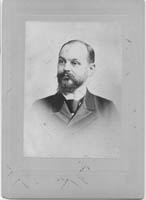
See also:
Chap. 01, p18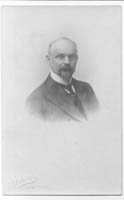
See also:
Chap. 01, p23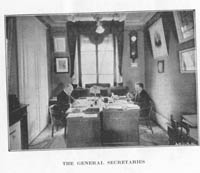
See also:
Chap. 02, p4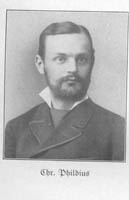
See also:
Chap. 04, p12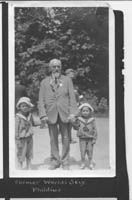
See also:
Chap. 06, p13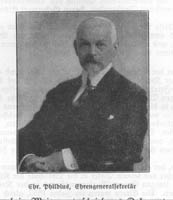
See also:
Chap. 10, p8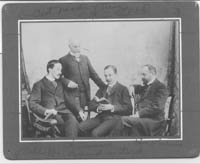
See also:
Chap. 12, p14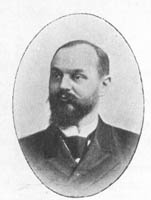
See also:
Chap. 19, p23World's Alliance General Secretary from 1896 to 1922, Phildius became the General Secretary of the Berlin Association in 1883. The Berlin Association was established on the American model of YMCA's, an interdenominational organization, and its establishment marked the beginning of the Christlicher Vereine jünger Männer(CVJM) or German YMCA. In May 1883, Phildius and Count Bernstorff began the organization of the Tenth World's Conference in Berlin for 1884 and the meeting was a great success. Phildius became active in World's Alliance meetings and at the Interlaken Conference in Switzerland in June 1889, Phildius called for the establishment of a Continental Secretaries Association, which would have excluded British participation. Because of Phildius' experience in developing secretarial training schools, the delegates at the London Plenary Meeting in 1894 invited Phildius to become a General Secretary of the World's Committee with Charles Fermaud. In 1896, Phildius traveled to Vienna to organize the Austrian YMCA and appointed Wold von Ziegler und Klipphausen as the organization's new leader. Phildius established a long-term relationship with the Austrian Association. In October 1896, Phildius arrived in Geneva and assumed his new duties. As a General Secretary, Phildius traveled across Europe and the Atlantic representing the World's Alliance at national YMCA conferences in Germany, Austria, Scandinavia, Finland, Russia, the United States, Canada, Italy, France, and Belgium. At the World's Alliance Plenary Meeting in Christiana in August 1902, Phildius took over all of the duties of visitation for the Alliance. Between 1902 and 1905, Phildius arbitrated tensions which emerged between the Anglo-American Associations, which supported an interdenominational approach to YMCA work, and the German National Association, which promoted Jünglingsvereine (Youth Movements) which were church-based. Although the German National YMCA threatened to withdraw from the World's Alliance in October 1904, Phildius helped avert a crisis. In 1910, Phildius and Fermaud visited Bulgaria and helped establish the Federation of Young People's Christian Organizations, the fore-runner to the YMCA in that country. With the onset of World War I, Phildius submitted a relief plan in August 1914 to the Executive Committee of the World's Committee to develop relief programs for soldiers, wounded, and prisoners of war. John R. Mott arrived in Berlin in October 1914 during his first wartime tour to Europe and met with Phildius, Mott promised to provide financial support for Phildius' plan to provide war work for Austro-Hungarian soldiers. When Archibald Harte arrived in Germany in March 1915 to negotiate American YMCA access to Allied prisoners of war, Phildius accompanied Harte to the Ministry of War meetings. After both secretaries toured German prison camps, the Ministry of War granted Harte permission to send American War Prisoners' Aid Secretaries. This opened the door to WPA operations across Europe and Harte and Phildius attended the inauguration of the first YMCA hut in Göttingen in April 1915. Harte scored another diplomatic success in May 1915 after a trip to Vienna where the Austro-Hungarian Ministry of War extended permission for the American YMCA to undertake WPA operations in the Dual Monarchy. Phildius supervised WPA operations in Austria-Hungary until the Summer of 1916 when Edgar MacNaughten arrived to become the Senior WPA Secretary in Vienna. As early as April 1915, tensions began to emerge between the World's Committee in Geneva and the International Committee in New York regarding the direction of WPA operations, and animosities arose between Phildius and Harte. In October 1915, the Bulgarian YMCA requested that the World's Committee send assistance to the kingdom. Phildius was unable to get to Bulgaria until December 1916, when he began negotiations with the Ministry of War. The Bulgarians approved Phildius' WPA proposal in January 1917, and the World's Alliance sent Ernst Sartorius as the Senior WPA Secretary. The Bulgarian government signed a formal WPA agreement with the World's Alliance in December 1917. When the United States broke off diplomatic relations with Germany in February 1917, most of the American WPA Secretaries left the empire; American secretaries left Austria-Hungary two months later. In May 1917, Mott asked Phildius to find qualified neutral secretaries to replace the departed Americans and the World's Committee General Secretary traveled to Scandinavia where he recruited Danish, Norwegian, and Swedish replacements. In August 1917, Phildius and Gerhard Niedermeyer, a leader of the German Christian Student Movement, went to Berlin and conferred with General Friedrich, the commander of the German POW camp system. While Friedrich demanded the withdrawal of American WPA secretaries from POW relief operations in Allied countries, he agreed to allow Conrad Hoffman, an American, to remain as the Senior WPA Secretary in Germany. In January 1918, Phildius traveled to Constantinople where he began negotiations with the Ottoman government to establish WPA operations in that empire. While the Turks accepted the proposal in February 1918, the lack of British support, insufficient funding, and Turkish suspicions prevented the implementation of the plan before the end of the war. Phildius addressed another German crisis in April 1918 when the German Ministry of War threatened to take over WPA operations and place Niedermeyer in charge in response to Mott's participation in the Root Mission to Russia. Phildius and Adolf Hoffmann traveled to Berlin and enlisted the assistance of Prince Maximilian of Baden to convince Friedrich to rescind the order in June 1918. In response to the crisis, Mott and Harte went to Geneva to confer with the World's Committee. Mott successfully defended his decision to go to Russia but Phildius accused Harte of financial malfeasance and working independently through Niedermeyer in Germany and the Miyak in Russia. Despite the accusations, Harte remained the General Secretary for WPA operations in Europe. After the war, new controversies arose in the World's Alliance regarding the deep animosity between the German and French Associations and the developing schism between the Anglo-American and European YMCA's. In April 1919, Mott met with the World's Committee to discuss plans for the establishment of a new League of National Association composed of British and American YMCA's, an organization designed to complement the World's Alliance. Phildius argued that in terms of finances and membership, the Anglo-American organization would dwarf the World's Alliance and effectively kill the Geneva movement. Mott agreed with Phildius and plans for the new organization were scrapped. Phildius resigned from the World's Alliance in 1922 and retired to Mayenfeld, Switzerland until his death in 1937.
Eberhard Phildius
The son of Christian Phildius, one of the General Secretaries of the World's Committee, Phildius was a Swiss YMCA secretary who volunteered to support War Prisoners Aid (WPA) work for Allied prisoners of war in Austria-Hungary. He began work with Italian POW's at Mauthausen in Upper Austria (Oberösterreich) in May 1916 and maintained operations for four months. Phildius was also active in supporting war morale work for Austro-Hungarian soldiers in the imperial army.
F. L. Porter
Before the beginning of World War I, Porter was the YMCA Visiting Secretary to His Majesty's Prisons in England. The English National Council reassigned Porter to develop prisoner of war relief operations in British POW camps by the end of 1914. Porter visited prison facilities, conducting spiritual comfort and reading materials to German prisoners. He also developed relief operations for British guards at POW camps. When C.V. Hibbard first approached the English National Council regarding the appointment of American YMCA secretaries to work in British prison camps, Sir Arthur Yapp, the General Secretary of the English National Council, was hesitant. He was not confident that the British Army would allow neutral secretaries to serve in prison camps and argued that the English National Council was already undertaking POW relief work through Porter. With Archibald Harte's success with the German government in March 1915, however, Yapp reconsidered his position and requested that the American YMCA dispatch three secretaries to assist Porter in the field.
Grafin Pourtales
Representative of Crown Princess Margaret of Sweden and wife of Graf Friedrich von Pourtales, the pre-war German ambassador to Russia, Grafin Pourtales sought to improve the condition of prisoners of war. She was the President of the Women's Service of German Prisoners' of War Aid, a relief agency which worked closely with the Logistical Section of the German Ministry of War. Pourtales sought to send warm clothing and food to German POW's in European Russia and Siberia. Pourtales made arrangements with Conrad Hoffman for American War Prisoners' Aid Secretaries to distribute winter clothing to German prisoners of war who were not directly served by U.S. embassy personnel.
